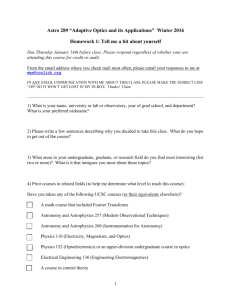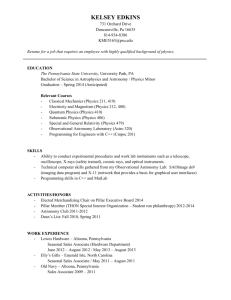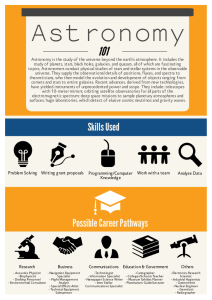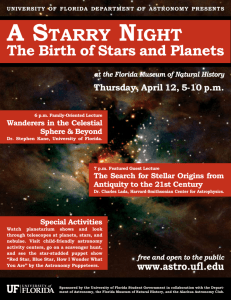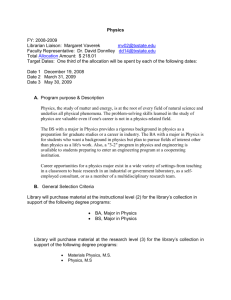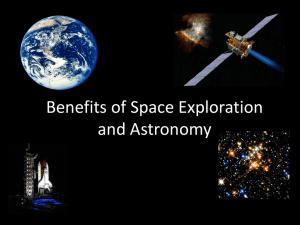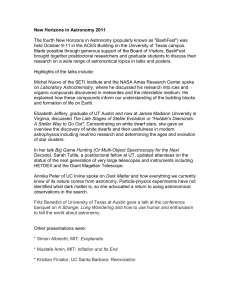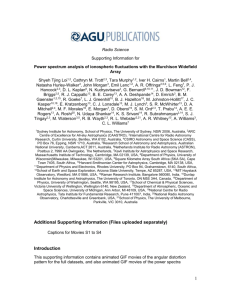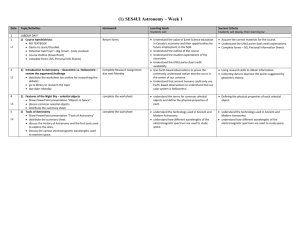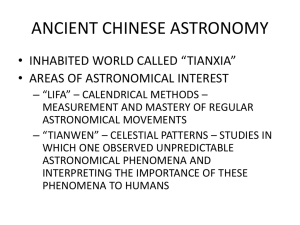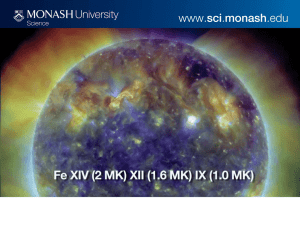Trifold brochure Template
advertisement
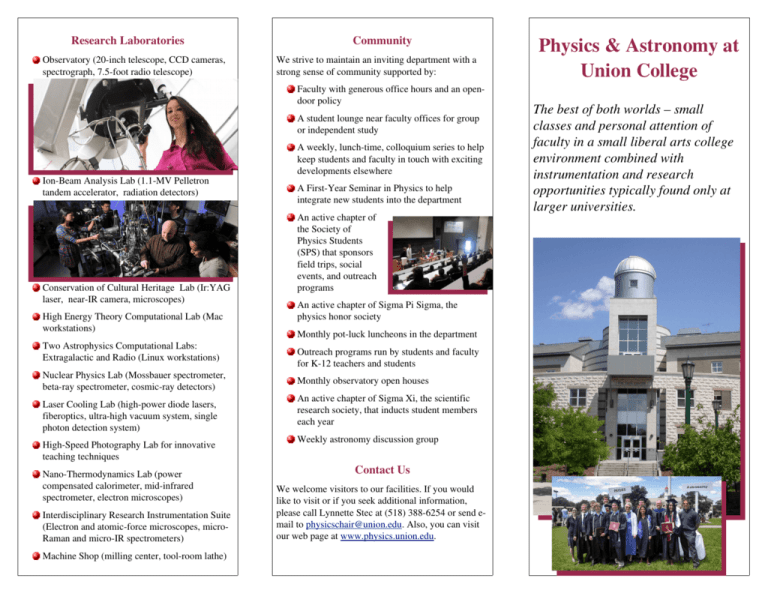
Research Laboratories Observatory (20­inch telescope, CCD cameras, spectrograph, 7.5­foot radio telescope) Community We strive to maintain an inviting department with a strong sense of community supported by: Faculty with generous office hours and an open­ door policy A student lounge near faculty offices for group or independent study Ion­Beam Analysis Lab (1.1­MV Pelletron tandem accelerator, radiation detectors) Conservation of Cultural Heritage Lab (Ir:YAG laser, near­IR camera, microscopes) High Energy Theory Computational Lab (Mac workstations) Two Astrophysics Computational Labs: Extragalactic and Radio (Linux workstations) Nuclear Physics Lab (Mossbauer spectrometer, beta­ray spectrometer, cosmic­ray detectors) Laser Cooling Lab (high­power diode lasers, fiberoptics, ultra­high vacuum system, single photon detection system) High­Speed Photography Lab for innovative teaching techniques Nano­Thermodynamics Lab (power compensated calorimeter, mid­infrared spectrometer, electron microscopes) Interdisciplinary Research Instrumentation Suite (Electron and atomic­force microscopes, micro­ Raman and micro­IR spectrometers) Machine Shop (milling center, tool­room lathe) A weekly, lunch­time, colloquium series to help keep students and faculty in touch with exciting developments elsewhere A First­Year Seminar in Physics to help integrate new students into the department An active chapter of the Society of Physics Students (SPS) that sponsors field trips, social events, and outreach programs An active chapter of Sigma Pi Sigma, the physics honor society Monthly pot­luck luncheons in the department Outreach programs run by students and faculty for K­12 teachers and students Monthly observatory open houses An active chapter of Sigma Xi, the scientific research society, that inducts student members each year Weekly astronomy discussion group Contact Us We welcome visitors to our facilities. If you would like to visit or if you seek additional information, please call Lynnette Stec at (518) 388­6254 or send e­ mail to physicschair@union.edu. Also, you can visit our web page at www.physics.union.edu. Physics & Astronomy at Union College The best of both worlds – small classes and personal attention of faculty in a small liberal arts college environment combined with instrumentation and research opportunities typically found only at larger universities. Curriculum In Physics and Astronomy at Union College: Classes are small and personal All classes and labs are taught by regular faculty Instruction is characterized by individual attention The faculty are thoroughly dedicated to teaching, regard research as an essential part of their profession, and welcome students to join them in the joy of discovery Courses are innovative and employ active learning strategies The curriculum emphasizes hands­on experimentation The equipment holdings are comparable to those of a much larger institution All of the equipment is really used by students The curriculum is designed to develop a wide range of analytical and practical skills We offer core courses in undergraduate physics plus more specialized courses in areas such as astrophysics, biophysics, and nuclear physics Students may pursue a B.S. degree in physics, a B.A. degree in astronomy, and/or minors in physics, astronomy, and astrophysics Independent research with a faculty colleague is required for the major Student Research The best education a young scientist can acquire occurs beyond the classroom, and the department provides a variety of extracurricular opportunities with this in mind. These include: Teaching Faculty and Staff Samuel Amanuel, Associate Professor Ph.D., Southern Illinois University Material science Student­faculty research during the school year Reuben Gann, Visiting Assistant Professor Ph.D., University of California at Riverside Surface physics Departmental summer research program (typically 15­20 students) Gregory Hallenbeck, Visiting Assistant Professor Ph.D., Cornell University Radio astronomy Stipends for summer research from faculty grants, Union College, and the departmental undergraduate research fund Rebecca Koopmann, Professor and Department Chair Ph.D., Yale University Extragalactic observational astronomy Summer research opportunities at research institutions, national, and industrial labs Student presentations at regional, national, and international conferences Student co­authored publications in scientific journals Membership in the Association for Research at University Nuclear Accelerators (ARUNA) and a collaboration of accelerator groups at small colleges Membership in the NASA NY Space Grant Collaborations with research universities (Cornell, RPI, Albany) and industry (IBM) Lead institution for the NSF­funded Undergraduate Arecibo Legacy Fast ALFA Team Scott LaBrake, Senior Lecturer and Accelerator Manager Ph.D., The University at Albany Accelerator and environmental physics Seyfollah Maleki, Professor Ph.D., Rensselaer Polytechnic Institute Laser optics and scientific analysis for art conservation Nelia Mann, Assistant Professor Ph.D., University of California at Santa Barbara High energy theoretical physics Jonathan Marr, Lecturer and Laboratory Manager Ph.D., University of California at Berkeley Radio astronomy Chad Orzel, Associate Professor Ph.D., University of Maryland Atomic physics Gary Reich, Professor Ph.D., Rutgers University Statistical mechanics and physics education research John Sheehan, Machinist/Technician Lynnette Stec, Administrative Assistant Michael Vineyard, Frank and Marie Louise Bailey Professor of Physics Ph.D., Florida State University Experimental nuclear and environmental physics Heather Watson, Visiting Assistant Professor Ph.D., Rensselaer Polytechnic Institute Geophysics Francis Wilkin, Senior Lecturer and Observatory Manager Ph.D., University of California at Berkeley Extrasolar planet observations and star formation theory

